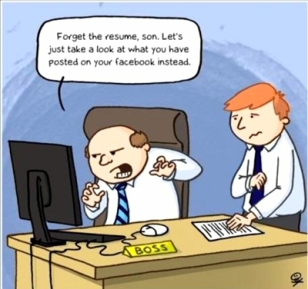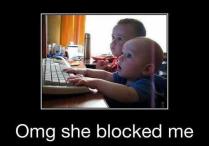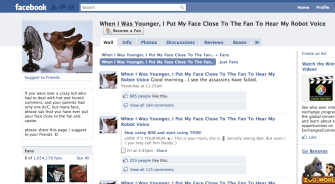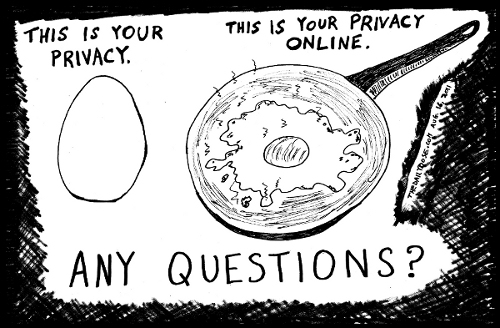Online Privacy: Think Before You Post
Do you want to know when I started getting really concerned about my online privacy in an expanding world of technology? No? Too bad, I’m telling you anyway. I had been posting an add on Kijiji about babysitting for the summer a few years back, and I’d included my name, sex, and age in the post, as parents usually want mature female babysitters. The next day I checked my e-mail and had some responses. However, to my horror, one was from someone claiming to be a 64 year-old male who “looked 50” and wanted to know if I was “interested in babysitting.”
I actually replied with the image to the left, and never heard from him again. However, that’s when I started to get a little concerned about the consequences of what I posted online, who could access that information, and what they could learn about me from it.
What’s the Big Deal about What I Post Online?
The consequences about what you voluntarily post online are discussed in a recent TED talk, where computer scientist Jennifer Golbeck from the University of Maryland talks about how by accessing information you post online, she can infer a lot about you, like yourgender, sexual orientation, intelligence, religion, personality, political preferences, relationships with other people, etc.To illustrate this, Goldbeck uses the example of Facebook. Because millions of people have Facebook accounts, there is a huge amount of demographic data available. And because Facebook doesn’t care about your privacy, it has no problem breaching Canadian Privacy Laws by sharing your personal information (even after you’ve deactivated your account) with developers.
During the TED talk, Goldbeck refers to a study where scientists surveyed which pages people had “liked” on Facebook, and then used that data to infer certain things about them. She admits that it would be very easy to collect this data, makes inferences about you, such as how well you work in teams, how reliable you are, etc. and sell it to companies so they could screen for the best employees.
Getting worried? Me too. But do you know what’s even scarier? Some employers are already starting to use Facebook as a way of running a background check on potential employees. They may do this by requesting that you supply your Facebook password during an interview, or asking that you log in in front of them, or asking you to “Friend” them on Facebook so they can see what you’ve been posting. Which is bad news for you if you post things like the image to below as your status.
Wait, isn’t it Illegal for Employers to Access My Facebook Information?
Technically no, as they’re only required not to discriminate based on age, sex, race, gender, medical conditions, disabilities, etc. but I’m sure some bias would creep in if they saw pictures of you drunk at a party… or if you posted the above image as your Facebook status. I know I’d never hire you if you posted it.
However, if the employer were to see a questionable post or image, it opens up a whole other can of worms. For example, if they were to see your party pictures from last weekend, and noticed that you drink, they might ask something like “How much alcohol do you consume per week on average?” which may lead to further questions like “Have you ever had your driver’s license suspended? Was it due to alcohol or something else?” This might seem harmless, but if you had your driver’s license suspended due to medical conditions, like a stroke, then you’ve admitted to having a medical condition that might make you appear less capable of performing the job compared to someone else without that condition.

At least you won’t have to write any more cover letters, right? Your profile picture is likely enough.
Employers aren’t supposed to discriminate based on medical information, but now they’re aware you have a medical condition, which might play a heavy role in deciding if you’ll be hired or not. The thing that really bothers people is that the company wasn’t supposed to have access to that information in the first place, because they may be biased against you and choose not to hire you, even though they’re not supposed to discriminate based on something like a medical condition.
But, what if you were aware of these issues and chose not to disclose your Facebook information to an employer, knowing that they may be biased anyway towards your medical condition? Wouldn’t the employer infer you had something to hide? Would that play a role in their decision to hire you too?
Evidently, this can get complicated pretty quickly, and you can read more about it here if it interests you. However, it’s important to remember this is just one scenario where what you voluntarily post online can be used against you, so if you’re reading this blog and looking like the image below right now, I don’t blame you.
Another Cautionary Tale: The Story of Yuri Wright
I remember being in high school and attending an assembly on the dangers of posting too much personal information online. A former sports player was speaking about how he lost his scholarship to a university sports team because of something he posted online; this is similar to Yuri Wright’s story of how he was expelled from school for posting inappropriate messages on his Twitter account that his school found out about.
Should he have posted the messages in the first place? Of course not. He even received warnings and didn’t listen. But did the school have a right to expel him based on something he posted from his Twitter account? Again, this is another grey area. Some people might feel that what they post online shouldn’t really have an influence in the “real world” – that their online persona and actual self should be kept separate… but by posting online to such a popular social media site like Twitter, wasn’t he kind of advertising his messages anyway, despite being warned?
See how complicated this can get?
I’m not really sure there’s a definite answer to any of these questions, but you’re going to have to excuse me for a moment because I’m going to get all philosophical on you. But before I do, I want you to think of the definition of “self” for a moment.
And don’t you dare read ahead. Seriously, think about it.
What does “self” mean to you? Can you have many concepts of “self”? Do you have an “online self” that is separate from your “real-life self”? Personally, I think your private “online self” and your “real-life self” are the same person, after all, it’s still you posting stuff, right? That’s why I think Wright should be held responsible for his actions, because if what you post online has “real-life” repercussions, your “real-life self” should be held responsible.
What Can I Do to Protect Myself Online?
I think the safest thing you could do would be to stop reading this blog right now, deactivate all your accounts on social media sites, and never write another post, tweet, or e-mail again. Seriously. If you’re still tempted to use your computer, smashing it with a big hammer into bits should do the trick.
What was that? You need your e-mail address, Facebook, Youtube, and Twitter account to tell your friends about that adorable video of kittens playing on Tumblr?
Well, I’ll offer some other advice then. Just keep in mind that this is only a short list of ways you can protect yourself online, and there are many more precautions you can take, so do your research and don’t limit yourself to just these suggestions:
#1 Common Sense. In my opinion, this is the best tool you have to protect yourself. Next time you’re writing a Youtube comment or Tweeting about how many beers you drank last weekend or ranting on Facebook about how horrible your boss is, stop and think. What if my boss saw this? What if my mother saw this? What if my school saw this? How would it affect me? You can also refrain from filling out all your profiles on social media… personally I never fill out where I live or supply my phone number or personal e-mail.
#2 Be Aware of Privacy Settings. Did you know that many social media sites have privacy settings so you can restrict who has access to your posts? For example, on Facebook, there are privacy settings that allow you to regulate who sees your posts and sends you messages and requests. You could allow just your Facebook “friends” to see them, or “friends of my friends,” or just certain people. Furthermore, if you’re worried about people seeing the not-so-glamorous photos or posts you’re tagged in, there’s even an “only me” setting where no one can see what you’re tagged in – only you can, and you can choose to approve them should you want someone else to see. There are even ways to regulate who can post on your wall.

Privacy settings mean you can block that annoying relative of yours (y’know, the one who always posts pictures of their kids) from commenting on everyone one of your Facebook statuses with “lol.”
However, it’s important to note that whenever Facebook updates, it usually restores all your settings to the default “public” (meaning anyone can see them), so be sure to check your settings regularly.
#3 Spread the Word! Tell your friends, family, and pet cat about these issues, and inform them how they can protect themselves. You might even learn some other ways to protect yourself that aren’t on this list.
Hopefully, by now you’ve learned a little more about your online privacy, and how to protect yourself. To conclude, I’ll leave you with this last image.





